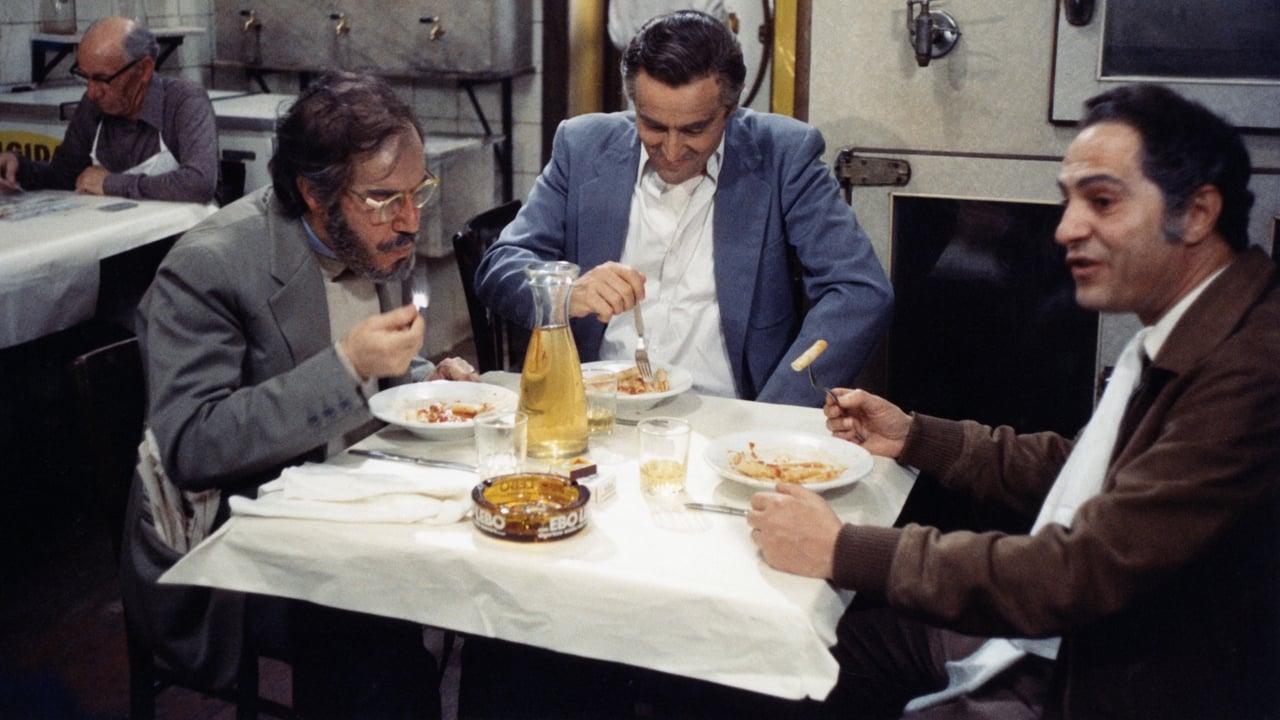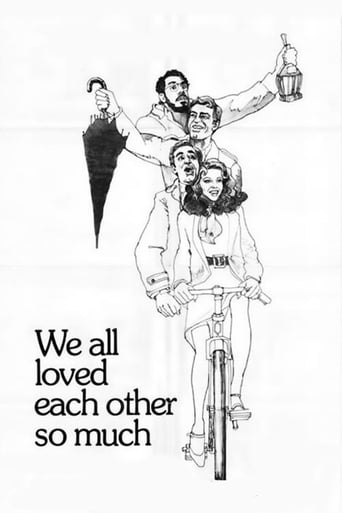



Good start, but then it gets ruined
Excellent but underrated film
The joyful confection is coated in a sparkly gloss, bright enough to gleam from the darkest, most cynical corners.
View MoreThis film is so real. It treats its characters with so much care and sensitivity.
View More"We All Loved Each Other So Much" is one of those classics referenced here and there (though not so frequently) as a spectacular masterpiece, an almost unknown treasure to be sought and seen. After years looking for it I can finally say those opinions are right. But the movie deserves more. A heavy airplay on cable or even regular TV, a Criterion Collection treatment or a bigger studio making a massive home video release instead of cult cine-clubs who exhibit it from time to time. This movie is on the same league as "Amarcord", "Cinema Paradiso" and "Splendor" (1989) . The latter, like this one, is also directed by Ettore Scola and could be included as part of an informal Scola trilogy about nostalgia, that should be completed with "Le Bal" (1983). The themes and presentation of such are beautifully told, almost like a trademark that Italian and French cinema use frequently and always getting positive results that American cinema only dreams of reaching. The mark achieved here is to show the importance of memory, how time changes it, and the way things and events mold our essence, our friendships, our loves, our interests and each person's definition of happiness. And most important of all: how movies are a great part of all those things.This is about three friends who served on the Italian resistance fighting against the Nazists and how their lives changed of direction during a course of 30 years. Mostly is about their similarities (at one point they all fell in love with the same woman) and the problems and events brought on them, with meetings and mismatches along the way. They are: Antonio (Nino Manfredi), a dedicated nurse whose career just stalled because of his political views, contrary to the current norm; the lawyer Gianni (Vittorio Gassman) an impeccable professional at the city hall who ends up corrupted by a powerful industrialist; and Nicola (Stefano Satta Flores), a movie buff who later becomes a film critic leaving family and kid behind after defending the greatness of "Bicycle Thieves" when the movie club he was part of accused De Sica's masterpiece of giving Italy a bad fame to the world. The space is short, and I can't talk about all the characters but I must focus on my favorite, and the one I believe most of us will strongly identify with: the film addict, vigorously played by Satta Flores. Admit it, we are like him. Not in the wider sense of being extreme like he was but close. But I think we could lose friendships over our film ideals, defended to the death; we all like to believe we know everything about the subject and we really feel sorry for him when he loses the TV quiz about Italian cinema with a problematic misinterpreted question (he was right on the issue but the proposition was more simple than his answer). And if possible we would talk hours and hours and with the same verve and passion displayed by him. In an unforgettable moment, he recreates the Odessa stair sequence from "Battleship Potemkin" just to amuse a girl - and he succeeds it a bit! And that's what this movie is about: the power of movies and its importance in one's life. Nicola, like Antonio is known for his labor, don't get paid well and is far gone from his idealistic days after the war but he's deeply involved with what he does. A little cynic but happy which is the complete opposite of the more distanced friend, Gianni - but that's a story for you to discover by watching it. Scola's nostalgic look for the past is embraceable, real, colorful but not that much, revealing the essence of who we truly are, people who think to have control over everything in our lives and we don't. At times engaging, lovely, other times saddening and so hard to not include events of your life and compare it with what the characters go through. Time comes and goes, our needs change, our concept of life and happiness go the same way as well or don't, we can disagree on politics and movies but there's friendship, love, admiration. And we are deeply connected by experiences, the best ones and the worst ones. I think if the trio had to select a moment to remember it would be their final battle during the war, in those snowy mountains. They would never have that same bond again. My favorite bit involving one of them was when the nurse got stopped by a film crew making "La Dolce Vita". The magic of it? Fellini and Mastroianni are there to play themselves recreating the famous Fontana de Trevi sequence, fourteen years later. Unforgettable. You won't be the same after watching this. 10/10
View MoreEttore Scola films were always sentimental, pretentious and self-important, full of laborious gimmicks, big themes and immortal phrases. The ambitions were huge (remember "The night of Varennes", "The terrace", "The family", etc.). Sadly, the achievements were mediocre and inversely proportional to the ambitions. Sometimes, only the actors were bearable and help a little (here Manfredi and Sandrelli, Loren and Mastroianni in "Una giornata particolare").In "C'eravamo tanto amati" we have also big themes, but Risi in "Vita difficile" did first and better. Immortal phrases: "We wanted to change life, but life changed us". Stereotypes: the leftist becomes corrupt and capitalist, the money bring no happiness, the idealist movie critic is too impulsive, etc. Gimmicks: the actors talk to the camera and think aloud, colour and b.w. alternates. Besides, the homages to the Italian cinema are crude and obvious. Scola seems to be blackmailing us: "If you don't like my movie, you don't like Fellini, Antonioni and De Sica".I saw this movie many years ago and didn't remember it. I just got today the DVD via Amazon, I have seen 90 min. of the film and I have thrown the DVD to the wastepaper basket
View MoreMy only all-time favorite, ever since 1979 in Tuschinski. The theme is simple, strong and light, and does not evoke grand historical events but a mere musing on one's own growing up. The use of black/white and sepia flashbacks, changing into into present day colors at a sidewalk drawing, give extra depth to past and present with only a few stroke of the brush. Extra attention has been devoted to sounds and melody: the voices of the main characters reinforce the roles. The melody theme is played simply on one trumpet and echoes the simplicity of the theme. The memory of the move does not fade even after 25 years. I guess it was intended to do so. A very natural composition.
View MoreScenes just jump out at you. The three friends going down the steps as one of them describes Eisenstein's Battleship Potemkin and another breaks down and cries. The fantastic re-enactment of Felini's most famous scene. The game show in which the nerdy film teacher gets a film-related answer wrong on a technicality (shades of John Turturo in Quiz Show). The three friends looking over a fence in a freeze frame at the end... Their expression stuck in one final disapointment.
View More